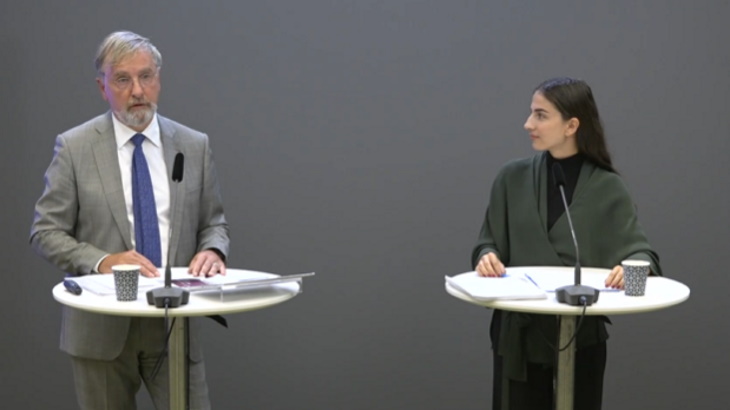
On 25 August 2022, the government at the time tasked SSM with reviewing the development of the regulatory framework and other measures needed to ensure that there are conditions for using both existing and future nuclear power. The assignment included identifying the need for development of the rules or other measures that can affect the conditions for the use of existing and new nuclear power, such as small modular reactors (SMRs), based on known, as well as new, reactor technology.
In October last year, Sweden's incoming centre-right coalition government adopted a positive stance towards nuclear energy, with the Christian Democrats, the Liberals, the Moderates and the Sweden Democrats releasing their written agreement on policies - referred to as the Tidö Agreement. With regards to energy, the agreement said the energy policy goal is "changed from 100% renewable to 100% fossil-free". In the Tidö Agreement, it is assumed electricity demand of at least 300 TWh in 2045, double the current demand.
SSM's assignment was slightly adjusted in dialogue with the Ministry of Climate and Business, so that it has been carried out in accordance with the Tidö Agreement.
The authority reported parts of the assignment to the government on 28 February. At that time, SSM stated that Swedish legislation for existing nuclear power reactors allows operation as long as the facilities are safe. Today it submitted to Climate and Environment Minister Romina Pourmokhtari its final report, which supplements the interim report with some additional constitutional changes and other measures.
SSM said it considers the regulations that exist today largely also work for new reactor technology. However, it makes a number of proposals, including: removing restrictions on the number of reactors, as well as equivalent conditions for different types of energy regarding possible placement and the municipal veto, through changes in the Environmental Code; providing some increased flexibility for different types and sizes of reactors and new players; clarifying and simplifying permit examination, for example by removing double application of the Environmental Code; extending and clarifying the Radiation Safety Authority's mandate to decide on permits and regulations; and increasing international cooperation and opportunities for building knowledge about new reactor technology, for example by introducing a process that precedes the permit review.
The authority also points to the need for new investigations so that Sweden's legislation can be adapted to new conditions and technological developments, for example with regard to contingency planning, financing issues and the system for handling radioactive waste and used nuclear fuel.
"With the proposals for a new nuclear technology law that already exist and the proposals that the authority is now presenting, we see that a possible permit review for new nuclear power can be made more efficient without sacrificing radiation safety," said SSM Acting Director General Michael Knochenhauer. "We also propose that a process for early evaluation of new reactor technology be introduced in Sweden. Together with increased international cooperation, it can improve the authority's conditions to carry out the permit review in an efficient manner, and reduce the risk of fundamental issues or obstacles to granting permits being identified late in the construction work."
Pourmokhtari said: "Climate change requires a doubling of electricity production, and nuclear power will have to account for a large part of that increase. The government sees that new nuclear power, corresponding to at least ten new conventional reactors, needs to be built by 2045. This report is an important basis when the government is now laying the foundations for climate change through the electrification of industry and the transport sector."
The government will present a roadmap later this year for the expansion of nuclear power, which it says will be necessary for Sweden to reach net-zero emissions by 2045 and "for the export of climate-neutral goods and services - which lower consumption-based emissions globally - to be able to grow".
Sweden's six nuclear power reactors, which are all about four decades old, provide about 40% of its electricity. In 1980, the government brought in a phase-out policy for nuclear power. The country's 1997 energy policy allowed ten reactors to operate longer than envisaged by the 1980 phase-out policy, but also resulted in the premature closure of the two-unit Barsebäck plant. In June 2010 parliament voted to repeal the phase-out policy but limited new nuclear to existing sites and as replacements for existing units. In 2015, decisions were made to close four older reactors by 2020.
Ringhals 1 and 2 were closed at the end of 2020 and 2019, respectively - several years earlier than planned due to the economic impact of punitive taxes.
In June 2022, Vattenfall announced it was initiating a pilot study to assess the conditions for proceeding with a decision to build at least two SMRs adjacent to the Ringhals plant. The study is expected to be completed by around late-2023 or early-2024.
In October last year. Finnish utility Fortum launched a two-year feasibility study to examine the prerequisites for nuclear new build in Finland and Sweden. The study will consider both SMRs and conventional large reactors. As part of the study, Fortum will examine commercial, technological and societal, including political, legal and regulatory, conditions for the construction of new reactors.